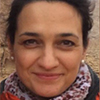


Select one of the options below:
Cultural Anthropology is an exploration of what it means to be a human being. This course examines diverse ways of living across cultures, taking in account differences in origin, language, historical traditions, family organization, economic and political systems, religions, among others. Anthropology takes a holistic approach to such topics as cultural and human survival, the formation of groups and the search for order and meaning, and how and why cultures change. Students will learn about the various methods anthropologists use to study the significance of human difference. Video clips will help students to visualize other cultures and other lives in motion. The readings and assignments seek to create a sense of self-awareness in the context of cultural difference and the relevance of that awareness when dealing with contemporary problems.
This course meets the All-University Core Curriculum (AUCC) requirements for Social/Behavioral Sciences (Category 3C) and is approved under gtPathways in the content area of Human Behavior, Culture, or Social Frameworks (GT-SS3).
Please have all textbooks in-hand at the beginning of the course.

9703109137 | teresa.tellechea@colostate.edu
Dr. Teresa Tellechea is a Cultural Anthropologist originally from Madrid, Spain, where she completed her BA in Philosophy and Ph.D. in Socio-Cultural Anthropology at Autonomous University of Madrid. She completed her doctoral coursework and research at CU Boulder for her dissertation on the intercultural aspects of disability in the United States. She has spent more than twenty years applying ethnographic tools to issues in different fields, including public and mental health, agriculture, criminal justice, education, and foreign affairs. She enjoys bringing her professional experience to her classes in the Anthropology Department. Dr. Tellechea’s applied work has focused on the socio-cultural dimensions of health disparities, human rights, and social injustice faced by minoritized groups. She has a keen interest in social documentary, having worked on visual ethnographic projects for State Department-sponsored Young Iraqi Leadership Program, West Bank Refugee Camp project through United Nations, and freelance work on the front lines of the Balkan War. Before a brief return to Colorado, Dr. Tellechea advised U.S. Embassy officials in identifying and understanding political, religious, and civil society trends and developments in Sri Lanka and the Maldives. Afterward, she worked in Saudi Arabia for two years where she co-founded the Saudi Women Intercultural Networking Group dedicated to connecting Saudi women with non-Saudi women through art and culture. Subsequently, Dr. Tellechea moved to Perú where she collaborated with a non-profit organization focused on indigenous communities in the Peruvian Amazon region. She was also involved in ensuring U.S. citizens incarcerated in Lima were treated in accordance with international human rights conventions. She is temporarily residing in Washington, DC preparing for her next endeavor in Nicaragua.